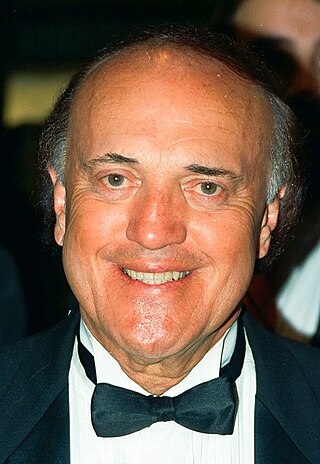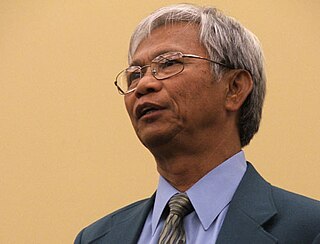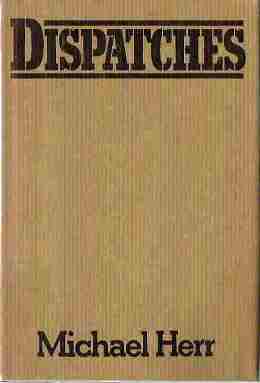Related Research Articles

Peter Gregg Arnett is a New Zealand-born American journalist. He is known for his coverage of the Vietnam War and the Gulf War. He was awarded the 1966 Pulitzer Prize in International Reporting for his work in Vietnam from 1962 to 1965, mostly reporting for the Associated Press.

Dith Pran was a Cambodian American photojournalist. He was a refugee and survivor of the Cambodian genocide and the subject of the film The Killing Fields (1984).
Sean Leslie Flynn was an American actor and freelance photojournalist best known for his coverage of the Vietnam War.

Sydney Hillel Schanberg was an American journalist who was best known for his coverage of the war in Cambodia. He was the recipient of a Pulitzer Prize, two George Polk awards, two Overseas Press Club awards, and the Sigma Delta Chi prize for distinguished journalism. Schanberg was portrayed by Sam Waterston in the 1984 film The Killing Fields based on the experiences of Schanberg and the Cambodian journalist Dith Pran in Cambodia.

Robert David Simon was an American television correspondent for CBS News. He covered crises, war, and unrest in 67 countries during his career. Simon reported the withdrawal of American troops from Vietnam, the Israeli-Lebanese Conflict in 1982, and the student protests in China's Tiananmen Square in 1989. During the Persian Gulf War in 1991, he and four of his TV crew were captured and imprisoned by Iraq for 40 days. He published a book about the experience titled Forty Days.

Dispatches is a New Journalism book by Michael Herr that describes the author's experiences in Vietnam as a war correspondent for Esquire magazine. First published in 1977, Dispatches was one of the first pieces of American literature that portrayed the experiences of soldiers in the Vietnam War for American readers.
Dana Hazen Stone was an American photojournalist who worked for CBS, United Press International, and Associated Press during the Vietnam War.

Al Rockoff is an American photojournalist made famous by his coverage of the Vietnam War and of the Khmer Rouge takeover of Phnom Penh, Cambodia's capital. He was portrayed in the Academy Award-winning film The Killing Fields by actor John Malkovich, although he has never been happy with this portrayal. Rockoff was born in Pawtucket, Rhode Island and is of half Russian and half Irish ancestry. After enlisting in the Navy while under age, he subsequently became an Army photographer in South Vietnam.
The Indochina Media Memorial Foundation (IMMF) was founded in 1991 by British photographer Tim Page, who survived multiple wounds while covering the Vietnam War. The foundation was set up to honor the memory of the more than 320 journalists from all sides who died while covering the conflicts in Vietnam, Laos and Cambodia from 1945 to 1975. Its other main aim was to assist colleagues in a region that was emerging from decades of war, poverty and isolation-remembering the dead by helping the living.

Kate Webb was a New Zealand-born Australian war correspondent for UPI and Agence France-Presse. She earned a reputation for dogged and fearless reporting throughout the Vietnam War, and at one point she was held prisoner for weeks by North Vietnamese troops. After the war, she continued to report from global hotspots including Iraq during the Gulf War.

Cal Perry is a former broadcast journalist who most recently worked for MSNBC. He previously worked at Voice of America in a senior role and briefly at Al Jazeera English. Before joining Al Jazeera, he worked for many years with CNN, mostly in the Middle East. During this time, he served as: Bureau Chief in Baghdad, Iraq (2005–2007), Bureau Chief in Beirut, Lebanon. From these bases, he also covered the wars in Lebanon (2006), Georgia (2008) and Pakistan (2008), plus the aftermath of the devastating cyclone in Bangladesh, in 2007. In 2022, he joined the Baltimore Orioles as senior vice president and chief content officer.

The Vietnam War POW/MIA issue concerns the fate of United States servicemen who were reported as missing in action (MIA) during the Vietnam War and associated theaters of operation in Southeast Asia.

Seymour Topping was an American journalist best known for his work as a foreign correspondent covering wars in China, Korea, Vietnam, Laos, and Cambodia, and the Cold War in Europe. From 1969 to 1986, he was the second senior-most editor at The New York Times. At the time of his death, he was the San Paolo Professor Emeritus of International Journalism at Columbia University, where he also served as administrator of the Pulitzer Prizes from 1993 to 2002.
Donald Kirk is a veteran correspondent and author on conflict and crisis from Southeast Asia to the Middle East to Northeast Asia. Kirk has covered wars from Vietnam to Iraq, focusing on political, diplomatic, economic and social as well as military issues. He is also known for his reporting on North Korea, including the nuclear crisis, human rights and payoffs from South to North Korea preceding the June 2000 inter-Korean summit.[1]

James Cowan Greenway was an American ornithologist. An eccentric, shy, and often reclusive man, his survey of extinct and vanishing birds provided the base for much subsequent work on bird conservation.
Leon Daniel was a reporter, manager, and senior editor of United Press International (UPI). He was considered to be the "gold standard" in wire service reporting.

Chas Gerretsen is a Dutch-born war photographer, photojournalist and film advertising photographer. His photographs of armed conflicts, Hollywood films and Celebrity Portraits have been published in major magazines.
Jonathan C. Randal was a foreign correspondent for numerous publications, including the New York Times and the Washington Post. His work as a reporter primarily focused on war zones, including reporting from Vietnam, Eritrea, Iran, and Lebanon Randal is also the author of four books which variously chronicle and apply his journalism to Middle East issues.

John Laurence is an American television correspondent, author, print reporter and documentary filmmaker. He is known for his work on the air at CBS News, London correspondent for ABC News, documentary work for PBS and CBS, and his book and magazine writing. He won the George Polk Memorial Award of the Overseas Press Club of America for "best reporting in any medium requiring exceptional courage and enterprise abroad" for his coverage of the Vietnam War in 1970.
References
- 1 2 "People: HDS Greenway". The World/Global Post. Public Radio International . 25 April 2011. Archived from the original on 25 November 2020. Retrieved 13 September 2020.
- ↑ "Membership Roster". Council on Foreign Relations . Retrieved 13 September 2020.
- ↑ Vuilleumier, François (1992). "In Memoriam: James C. Greenway, Jr, 1903–1989" (PDF). The Auk. 109 (2): 377–380. doi:10.2307/4088206. JSTOR 4088206.
- 1 2 3 4 "Biography: H. D. S. Greenway". American Academy in Berlin . Archived from the original on 22 March 2017. Retrieved 13 September 2020.
- ↑ Greenway, H.D.S. (November 21, 2013). "For a brief moment on Nov. 22, White House became a backwater". Tucson Sentinel. Retrieved 13 September 2020.
- ↑ Leeson, Marc. "Foreign Correspondent by H. D. S. Greenway". Books in Review. Vietnam Veterans of America. Archived from the original on 21 October 2021. Retrieved 14 September 2020.
- ↑ Foreign Correspondent A Memoir, Publisher Synopsis. 17 November 2018. ISBN 978-1-4767-6136-7 . Retrieved 14 September 2020.
{{cite book}}:|work=ignored (help) - ↑ Greenway, H.D.S. (April 1, 2008). "Dith Pran: A gallant guide". The New York Times . Retrieved 14 September 2020.